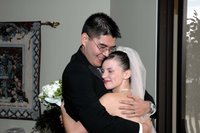Last night, I read a short interview with Frank Warren [of postsecret notoriety] on Quirkee.com. A wonderfully insightful quote reads, "...I think these cards represent something more than we can see. Maybe for these people, sharing their secret is a search for grace."
I think that it's such a beautiful thing to search for grace, but the indication and impetus that he's placed on his writers is that so many of them are writing their secrets out of a deeply ingrained and socially damning guilt. Why would you, or I, or anyone else search for grace if we didn't feel like we've all done something terribly wrong to someone else or something terribly wrong period? Maybe it goes without saying, but I agree with F. Warren. I think that my agreement moves beyond the bounds of his website and really encompasses much of the web community.
So much of what I read is an escape from what actually is. Words, thoughts, feelings, and implied actions tend to be so disjoint from the same in the physical world. I thought about going on with a discourse on the subject, but BP sums it up best on the front page of his blog saying, "...in blogworld, I can attempt to replace everyone else's perception of me with my imagined self." In that, he is describing this great disconnect of who we are and who we perceive ourselves to be. Blogs, myspace.com pages, and similar venues tend to be rife with the sort of assumption of the recreation of self without the hindrances of outward assessment.
This isn't all bad, however.
On a fundamental level, the quasi-anonymity that people believe they have while surfing the web works to lower the social guards that people use in attempts to deflect embarrassment and shame [That's essentially what F. Warren says in his interview anyways]. Being the case, there is a sense that man [or man with the wo-, as the case may or may not be] is subsequently fundamentally deeper than what is generally revealed in social settings. What the web provides then, in this "search for grace," is the general acceptance and encouragement that we need in order to bring this "deeper self" to the forefront.
What the web doesn't provide [except in rare cases, as I've heard] is the accountability that's usually provided when a close friend comes to you after a comment or an action and says, "Wow, that's not really like you."
Gene Veith says that the postmodernist would say that our identities are linked solely to the situations that we may be involved in so that my person as an employee may not be the same as my person as a father or a husband and that who I portray myself to be is an act to fill the conditions of my social identity [though, I don't believe he is a proponent of the view]. I would say that we are who people think we are and not who we necessarily believe ourselves to be [though, there are some exceptions to the rule]. It's not to say that we are defined by our societal responsibilities and stations. It is to say that our societal responsibilities and stations tend to actually reveal the jewels and junk that are buried in our character.
The web offers this atmosphere that doesn't judge, criticize, or correct. Generally, we are free to create our realities as we wish them to be.
Maybe the hope of some who send their secrets into the oblivion of the WWW really believe that their guilt has been cleansed through the act of confession, but there's no grace with that...there's no redemption there. The act of confession therein is equitable to splitting doves and cattle, salting the meat, and burning an offering on an altar. The act as described is a strange work of righteousness that alleviates the consciousness of guilt without really addressing the root of the action that caused the guilt in the first place.
Of course, this is all on the assumption that folks are posting their secrets and searching for grace.
*a few books by the
 authors mentioned in this post:
authors mentioned in this post:









